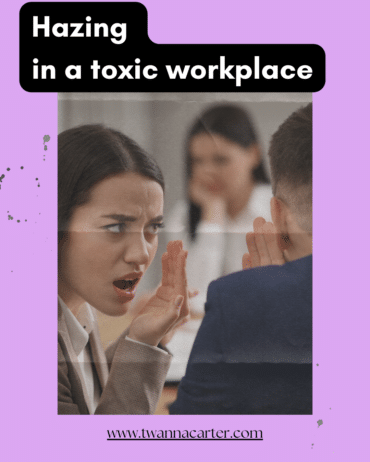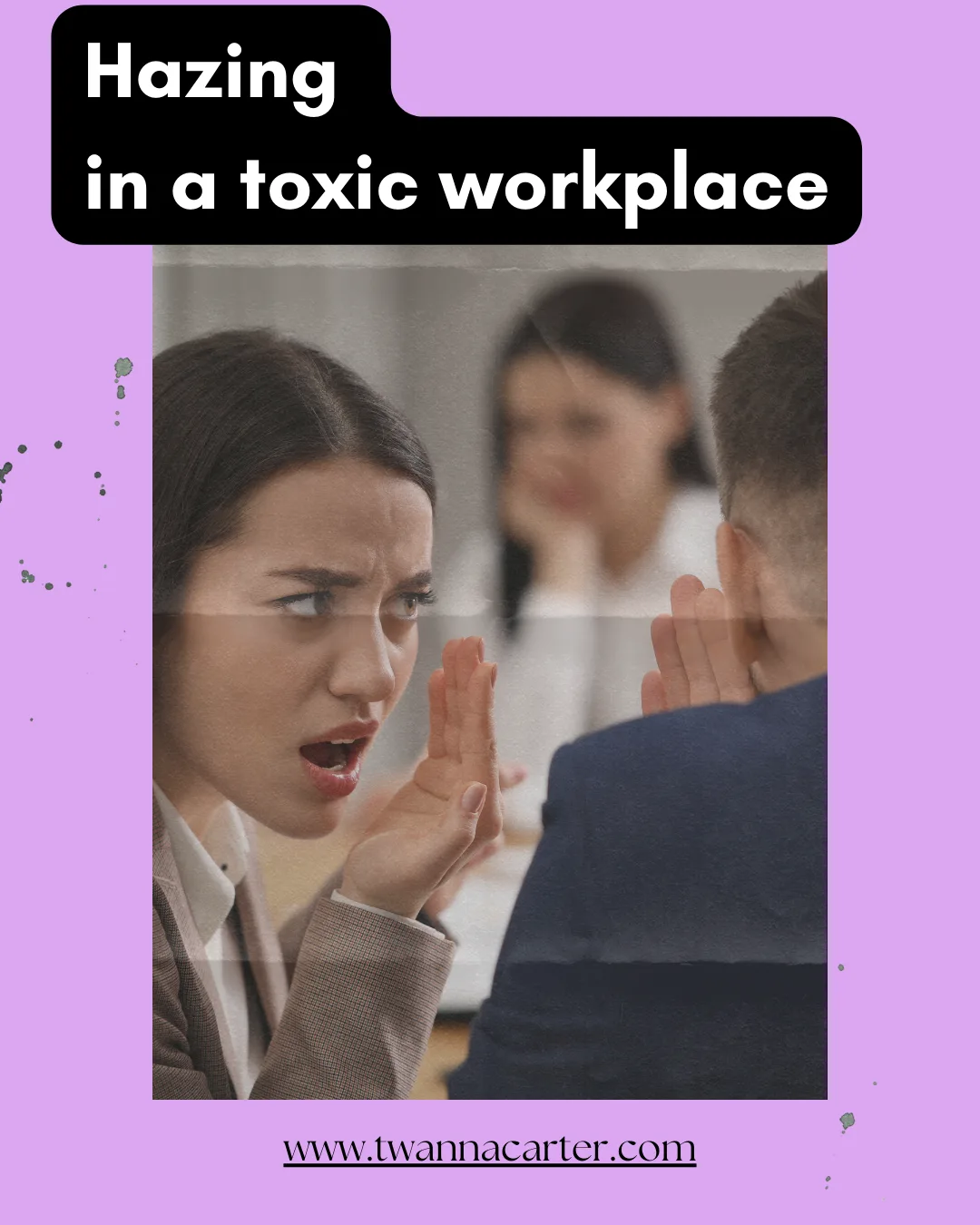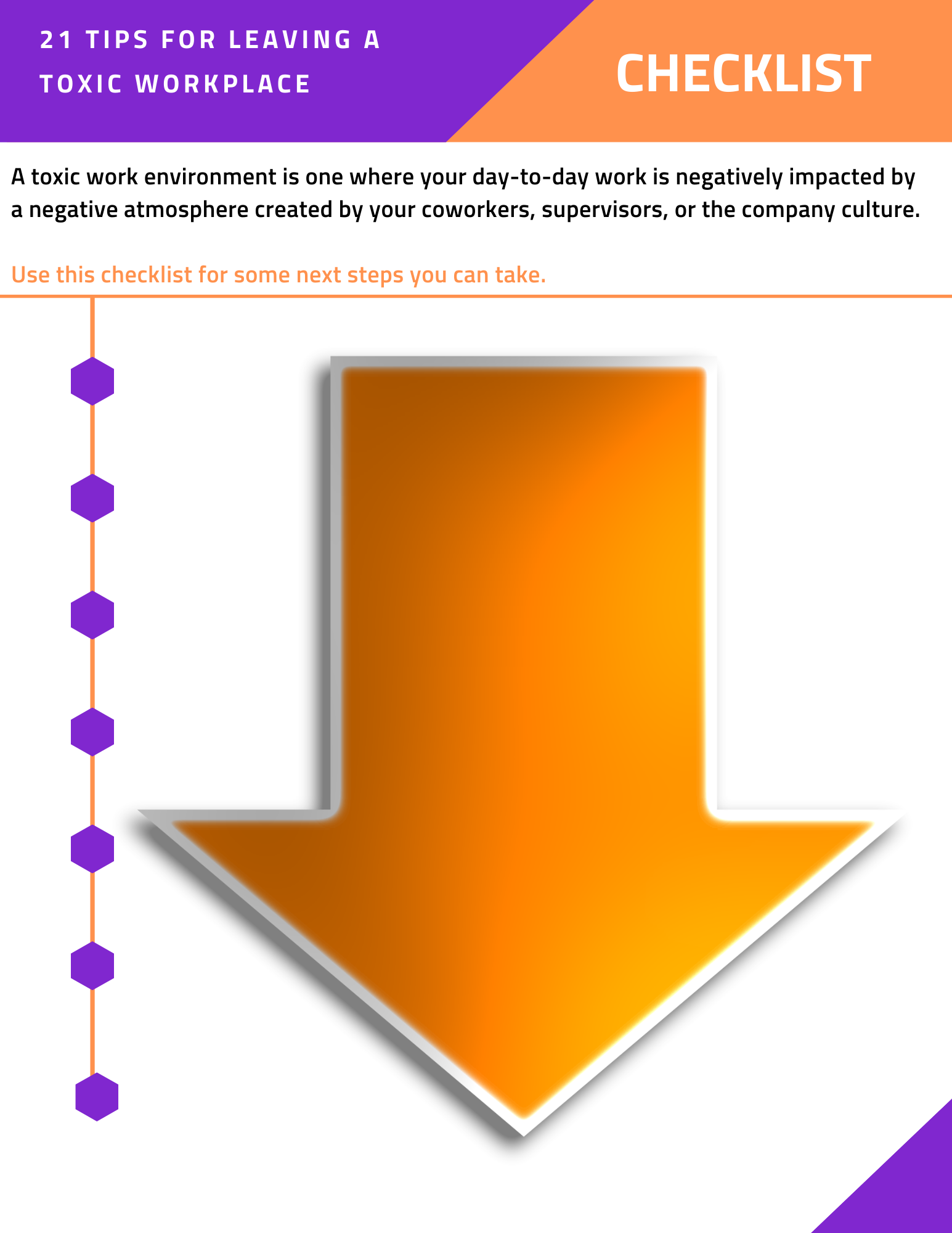November 15, 2021
9 Lifesaving Tip How to Survive Hazing in a Toxic Workplace
Before we talk about the 9 Lifesaving Tips on How to Survive Workplace Hazing in a Toxic Workplace, can we talk about vocational hazing for a moment? That’s just what I call it. You may also have heard it called corporate bullying.
You may also hear it referred to as workplace bullying, workplace hazing, or companies that “eat their young”.
When a workplace “eat their young” that means an organization or company hires new employees, colleagues, and even sometimes the supervisors, engage in behavior that is very troubling such as belittling, not explaining tasks, or saying things like “I had it tough, so you just need to figure it out”.
However you refer to it, it’s common in toxic workplaces.


Hazing Behaviors in a Toxic Workplace
- infighting
- sabotage by coworkers
- withholding crucial information
- negative gossiping about other team members
- backstabbing
- public humiliation
All the things you’ve seen on TV shows like Mad Men. In the real world, however, such commonplace destructive organizational behavior results in lower morale, higher turnover rates, less productivity, more absenteeism, greater stress among those who remain, and higher health care costs. Working in a toxic workplace is hazardous to your health.
Toxic Workplace is Detrimental to New Employees
It is especially devastating to newcomers, who may see it as a personal failure or something they’ve done wrong.
For employees with anxiety, these types of workplaces can really tick up the worry, fear, and stress. And ultimately burnout because you are trying to do a good job and simultaneously watch your back.
Deliberately or not, many organizations prevent new employees from feeling like full members of the team. Research shows that when people belong to groups where they feel accepted, they just do better work than those who don’t belong to such groups.
I’ve been in several organizations like this. The longer you stay, the more your mental health may decline. The stress of when will they “get” me takes its toll. It was through leaving that I learned how to do career transition. And how to recognize the signs of these toxic work environments.
I’ve also known several people who say, every job I get is like this. So, what’s the point of going through the hassle of getting a new job. These thoughts are when hopelessness starts to creep in.
Understand, that the longer you stay, the harder it can be to leave. If the company has a reputation, that reputation may follow you. The longer you stay, it may also be harder to get good references. I’ve had several clients who came to me for coaching with no reliable references.
Your self-esteem and confidence take a beating. So, it’s difficult to even see yourself doing better somewhere else. Which explains why people stay stuck in a toxic job environment 5, 10 and even 20 years! Read below for my experience leaving a toxic workplace because of workplace hazing.
Tips to Avoid a Toxic Workplace
While you may not 100% avoid these types of workplaces, here are some tips when you are in career transition or job seeker mode.
1. Use your network to vet the organization. LinkedIn is great for this. See what connections you have to the company you want to work for.
2. Do informational interviews with folks working there and folks who used to work there.
3. During the interview, ask questions such as
a. Tell me about the most recent successful hire
b. Tell me about a hire that didn’t work out
c. Ask about how direct reports would describe their management style
d. Ask them how they provide feedback
e. Ask how long they’ve had the current team in place and lastly
f. Ask for a description of the team culture
How I Left a Toxic Workplace
Ideally, you’d want to avoid taking a job with a toxic environment. But if you land there. It’s okay. Just immediately start planning your steps to get out. So you can make as quickly an exit as possible.
Earlier in my career, I once left a job after 2 months! I knew at the 15-day point (yes 15 days), the environment wasn’t healthy. The supervisor was extremely vindictive. And the longer I stayed, the worse it would be. And it took another month to exit right. Here are some useful steps for planning your escape.
1. Document, document, document. Cannot stress this one enough.
If you feel discriminated against or harassed, documenting is a life saver. If it gets ugly, you have proof of your actions. And theirs too. Writing also helps you understand that the issue is real, not imagined. Often time people with anxiety have problems deciding if they are overreacting. Writing helps you sort that out. It helps you realize when you are actually in a toxic workplace.
2. Carefully reach out to your network for other opportunities.
Why carefully? Some workplaces are brutal when they find out you’re trying to leave. It’s pretty bad when an entire workplace gives you the silent treatment.
3. When you first get a job, ALWAYS update your resume immediately in preparation for the next job.
Whether you need a job in a month or 5 years, you’ll feel that’s one less task to do.
4. Do stay in contact with your support group.
Isolation and aloneness magnify feelings of anxiety, frustration, and hopelessness. Remember you had value before the job, and you’ll have value after the job.
5. Seek professional help.
If you start to become so anxious or depressed that it’s interfering with everyday life.
6. Write down your plan.
Planning gives you hope that at some point you’ll be leaving.
7. Invest in a career coach.
They are skilled with helping you see beyond your current situation, as well as helping you strategize an exit plan. I’ve had clients who came to me for career coaching, and after working with them for just one session, I was able to identify they were in a toxic workplace.
Final Thoughts
If you are working in one of these type jobs, don’t give up hope. Be aware that sometimes, it is the job not you. I know that’s hard to believe when anxiety is riding high. And that’s why a career coach is so helping when you are trying to exit a toxic workplace.
But there is help. Set up a free 30-minute Career Solution Call with me today! Let’s look at a step-by-step plan to help you make the best career decision for you.
Looking for a Way Out?
Grab Your Complimentary Guide: 21 Tips for Leaving a Toxic Workplace below.
Equip Yourself with Practical Knowledge. Download Your Free Worksheet Today and Begin Your Journey to a More Positive Professional Life.
If you found this article informative, consider leaving a coffee tip here☕✨


Twanna Carter, PhD, ICF Professional Certified Coach (PCC), is a career coach and relationship coach for Twanna Carter Professional & Personal Coaching, LLC. As a career coach she is dedicated to empowering Black women leaders, helping them achieve their career goals. With more than 20+ years of experience, Dr. Twanna is recognized as an expert in leadership, personal development, business strategy, career development, and lifestyle balance. Helping professional women navigate change and uncertainty by providing them with the tools and strategies they need to be successful. Schedule a free 30-Minute Career Solution Call today.
Recommended Books
- Melaninated Magic: 180 Affirmations to Nurture Your Soul and Unleash Your Black Girl Joy by Twanna Carter, PhD
- “I’m Not Yelling: A Black Woman’s Guide to Navigating the Workplace (Successful Black Business Women)“, Elizabeth Leiba.
- “Crucial Conversations: Tools for Talking When Stakes Are High” by Kerry Patterson, Joseph Grenny, Ron McMillan, and Al Switzler.
- “Influence: The Psychology of Persuasion” by Robert B. Cialdini.
- “How to Win Friends and Influence People” by Dale Carnegie.
- “Lean In: Women, Work, and the Will to Lead” by Sheryl Sandberg.
- “Dare to Lead” by Brene Brown.
- “The Memo“, by Minda Harts.
- “Atomic Habits: An Easy & Proven Way to Build Good Habits & Break Bad Ones“, by James Clear
- “Worthy: How to Believe You Are Enough and Transform Your Life“, by Jamie Kern Lima
Also Read…
- Are You Really Being Too Much, Or Just Being Seen?Have you ever felt the need to shrink yourself at work or in social spaces, just to avoid being labeled as “being too much”?… Read more: Are You Really Being Too Much, Or Just Being Seen?
- Career Shift? These 9 Transferable Skills Resources Are Game-ChangersAs an executive-level professional aiming for a strategic career pivot, knowing your transferable skills isn’t just beneficial, it’s essential. Transferable skills are abilities you… Read more: Career Shift? These 9 Transferable Skills Resources Are Game-Changers
- You Need a Hustle Detox. Not Another Planner.Are you tired of buying yet another planner, hoping THIS one will finally fix your chaos? You know the drill: glossy cover, color-coded tabs,… Read more: You Need a Hustle Detox. Not Another Planner.
- The 5 Core Values Every Black Woman Executive Should Define Before Her Next Career MoveHave you ever felt overwhelmed by opportunities, yet unsure which path truly fits your ambitions, identity, and well-being? If you’re a Black woman executive… Read more: The 5 Core Values Every Black Woman Executive Should Define Before Her Next Career Move
- How to Protect Yourself from Being Managed Out – The Ultimate Survival Playbook for Black Women ExecutivesYou walk into the Monday morning meeting, coffee in hand, feeling ready to tackle the week. But something’s off. The room feels colder.… Read more: How to Protect Yourself from Being Managed Out – The Ultimate Survival Playbook for Black Women Executives
- What Your Inner Critic Is Really Costing You. And How to Take Back ControlHave you ever replayed a single mistake in your mind for days, doubted your abilities before a big meeting, or hesitated to ask for… Read more: What Your Inner Critic Is Really Costing You. And How to Take Back Control
- Why Black Women Execs Doubt Their Voice (and How to Reclaim Your Power)And it starts now. If you’re ready to reclaim your voice, you don’t have to do it alone. Schedule your V.I.P. Roadmap Session today.… Read more: Why Black Women Execs Doubt Their Voice (and How to Reclaim Your Power)
- The Trauma Behind the Mask: Why I Walked Away from My Six-Figure JobI didn’t leave my job because I was unqualified. I didn’t leave because I couldn’t handle the work. They began managing me out. Because… Read more: The Trauma Behind the Mask: Why I Walked Away from My Six-Figure Job
- Stop Overgiving. Because It’s a Silent Career Killer for High-Achieving WomenYou’re smart. Capable. The one everyone counts on. From boardrooms to family rooms, you handle it all with grace. But beneath the surface, you’re… Read more: Stop Overgiving. Because It’s a Silent Career Killer for High-Achieving Women
- You Feel Empty at Work, But Everyone Needs YouFor Black Women Who Keep Performing. Even When the Tank Is Empty Let’s keep it real for a moment, how many times do you… Read more: You Feel Empty at Work, But Everyone Needs You
- 🔍 5 Signs It’s Time to Change Careers (And What to Do About It)Have you ever sat in a leadership meeting and thought, “I’ve outgrown this version of myself”?Maybe your calendar is full, your inbox is overflowing,… Read more: 🔍 5 Signs It’s Time to Change Careers (And What to Do About It)
- Let Go of the Cape! Why You Don’t Have to Be Superwoman to Be SuccessfulIf you’re the go-to person at work, the fixer in your family, the one who makes it all look easy, this is for you.… Read more: Let Go of the Cape! Why You Don’t Have to Be Superwoman to Be Successful























+ show Comments
- Hide Comments
add a comment